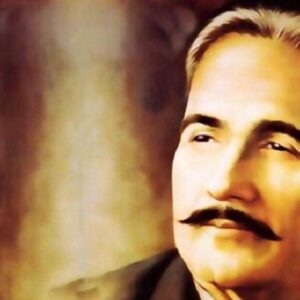Sir Muhammad Iqbal, popularly known as Allama Iqbal, was a British Indian poet, philosopher, lawyer, and politician. He is credited with being the driving force behind the historic ‘Pakistan Movement,’ in which he was one of the few leaders to first propose Pakistan as a separate nation for Muslims. Iqbal was a well-educated man who spent much of his time in India and a portion of his time in England and Germany, where he was exposed to the philosophies of Goethe, Heine, and Nietzsche. He joined the London branch of the All India Muslim League while studying overseas. After returning to Pakistan, Iqbal practiced law in India for a period before entering politics. He was noted for his legal skills, political ideals and underpinnings, and philosophical theories; he is remembered warmly as a wonderful poet and scholar. He became one of the most influential contributors to Urdu literature with works such as ‘Rumuz-i-Bekhudi,’ ‘Zabur-i-Ajam,’ and others. In 1922, King George V knighted him for his abilities and outstanding personality.
Childhood and Adolescence
Muhammad Iqbal was born to Sheikh Noor Muhammad and Imam Bibi in Sialkot, Punjab Province, British India. His father was an uneducated tailor, while his mother was a stay-at-home mother.
Iqbal was introduced to religious studies at the age of four and sent to a mosque to memorize the Qur’an. He studied Arabic at Scotch Mission College in Sialkot and completed his intermediate at Murray College’s Faculty of Arts.
In 1895, Iqbal began his bachelor’s degree at Government College Lahore, where he studied philosophy, English literature, and Arabic. He also earned his Master of Arts degree from the same institution and was ranked first at Punjab University in Lahore.
Career of Muhammad Iqbal
Iqbal received his Master of Arts degree and began his academic career as an Arabic reader at Oriental College, but he quickly rose through the ranks to become a junior professor of philosophy at Government College Lahore.
Iqbal chose to pursue higher education in the West and moved to England on a Trinity College, Cambridge, scholarship, where he got his Bachelors of Arts degree in 1906.
In 1907, he moved to Germany to pursue his doctorate, earning a PhD from Munich’s Ludwig Maximilian University. ‘The Development of Metaphysics in Persia,’ his doctoral thesis, was published throughout the process.
He went to India and took a job as an assistant professor at Government College in Lahore, but the job did not pay much, so he chose to pursue a career in law. From 1908 till 1934, he worked as a lawyer.
He became the general secretary of Anjuman-e-Himayat-e-Islam, an Islamic intellectual and political organization established in Lahore, Pakistan, in 1919, after being an active member for many years.
Iqbal was elected to the Punjab Legislative Assembly in 1927 and later to preside over the Muslim League’s session. In these capacities, he introduced the concept of ‘Pakistan’ for the first time.
Iqbal retired from the practice of law in 1934 due to ill health and was given a pension by the Nawab of Bhopal. He devoted his life to spiritual growth and to contributing to Persian and Urdu literature.
‘Payam-i-Mashriq (1923)’, ‘The Reconstruction of Religious Thought in Islam (1930)’, ‘Javid Nama (1932)’, ‘Pas Cheh Bayed Kard ai Aqwam-e-Sharq (1936)’, ‘Bal-i-Jibril (1935)’, ‘Zarb-i-Kalim (1936)’, and more works by Iqbal
Major Projects of Muhammad Iqbal
Iqbal was well-known for his legal expertise and political ideas, but he is best recognized as a poet. His contribution to Urdu literature is tremendous, with works such as ‘Rumuz-i-Bekhudi,’ ‘Zabur-i-Ajam,’ and others.
Personal History and Legacy
Iqbal married three times throughout his life: the first was in 1895 with Karim Bibi, with whom he had two children, Miraj Begum and Aftab Iqbal. Sardar Begum was his second wife, while Mukhtar Begum was his third (1914).
He died in Lahore in 1938 following a long battle with numerous ailments, which began with a mystery throat illness he contracted on a tour to Spain and Afghanistan. His grave was built at Pakistan’s Hazuri Bagh.
Muhammad Iqbal Net worth
Muhammad Iqbal’s estimated net worth is $ USD 2 million, according to online sources (Wikipedia, Google Search, Yahoo Search). His primary sources of income are poet, children’s writer, writer, politician, lawyer, and philosopher.
Trivia
In majority of Southeast Asia, he is known as the ‘Shair-e-Mashriq.’ ‘Muffakir-e-Pakistan’ and ‘Hakeem-ul-Ummat’ are two other names for him.
His birthday is a national holiday in Pakistan, and he is the country’s National Poet.
‘Saare Jahan Se Achcha’ is his first novel.
He is known as ‘Iqbal-e Lahori’ in Iran and Afghanistan.
His son, Justice Javid Iqbal, was a member of Pakistan’s Supreme Court.
In Pakistan, he has many public facilities named after him. The Allama Iqbal Campus Punjab University in Lahore, the Allama Iqbal Medical College in Lahore, the Iqbal Stadium in Faisalabad, and the Allama Iqbal Open University in Pakistan are just a few examples.


